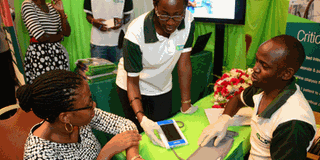Readers want Full Woman Health Camp taken to regions

A participant tests for blood pressure at the IHK tent. Photo by Michael Kakumirizi
What you need to know:
Appeal. Participants appealed to MPL to consider rolling out the event to the less privileged areas across the country.
KAMPALA.
Ecstatic participants in the just-concluded Full Woman Health Camp have asked Monitor Publications Ltd (MPL) to extend the event outside Kampala to benefit rural communities whose access to health information is limited.
Ms Emily Angella Bomisca, a social worker, who was among hundreds that participated in the 7th edition of the annual Full Woman Health Camp at Kampala Serena Hotel at the weekend, appealed to MPL and its partners to consider rolling out the event to the less privileged areas, like Karamoja region, where people have limited knowledge on health issues.
“We need information that will help us take care of our health. These services offered at the Camp are rare in Karamoja and I think it is a great opportunity for me to learn and share with my people,” Ms Bomisca said, adding: “I will tell my people about the importance of routine checks just like I have been checked for blood pressure.”
The annual camp, now in its 7th year, is a platform through which MPL under its Full Woman magazine, gives back to readers through providing a forum where they can interact with health specialists and share ideas on health issues.
Ms Sumaiya Nakimbugwe, a resident of Namugoona, said: “I thought I had breast cancer but after screening, I am sure I don’t have it,” she noted.
Ms Nakimbugwe was in the company of her husband and their baby.
At the camp, hundreds of participants were grouped in different sessions where experts made presentations on fertility, sexuality and parenting. Married couples were equipped with tips on how to keep their relationships relevant and interesting.
Dr Morris Eluga, a senior embryologist at the Women’s Hospital International and Fertility Centre, explained to women how infections and blockages in their fallopian tubes can affect their fertility. He advised them to always seek treatment together with their partners whenever they have challenges in conceiving.
“It is only women who normally go to find out the problem but at times it might be the man’s problem,” Dr Eluga said.
Dr Emmanuel Okullo, the head of Obstetrics and Gynecology at IHK, observed that there is an improvement in assisted reproduction in the country. He said Uganda currently has seven fertility clinics.
In her presentation, the chief executive officer of GasoPharm Ltd, Ms Karima Amin Kamru, warned the public against using the morning after pill. She said some men have been taking the contraceptive pill which is only meant for the females.
Trade minister Amelia Kyambadde, who was the chief guest at the event, called for early introduction of sexuality education in schools while at the same time challenging those opposed to the idea. She also warned employed Ugandans against office romance and sexual harassment.
“I had an uncle who used to touch my breasts inappropriately but at the time, I didn’t know it was harassment,” Ms Kyambadde said, as she shared her challenges while growing up as a girl-child.



